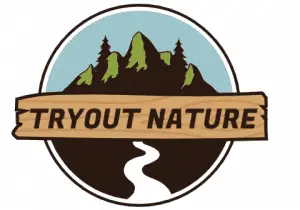I know the temptation of putting a few snowflakes into your mouth – it could be so refreshing when spending the time outdoors. On a few camping adventures, I even took advantage of it to save water and reduce the burden on my back. Still, a few of my friends have warned me that doing so might end up with dehydration. Is it true? Does eating snow dehydrate you? To answer this question I began to research the internet a little deeper.
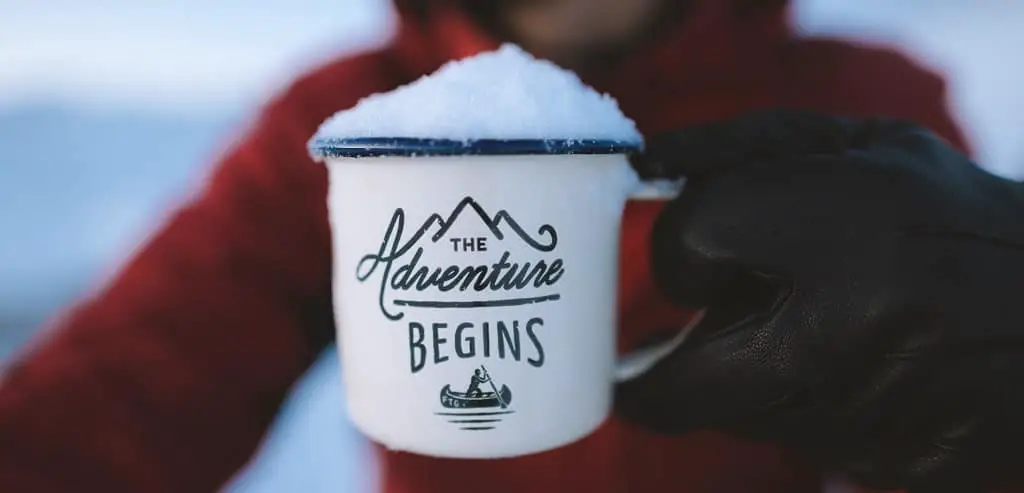
Eating snow doesn’t dehydrate you since the water consumption in the caloric burning process is much lower than the water you consume when you eat snow.
On the other hand, eating snowflakes might feature a few other risks which I will elaborate later on in this article.
The Caloric Misconception
When people are told that eating snow might help dehydration, they also hear about the caloric theory regarding digestion.
According to this, we burn more energy to heat the snow we eat rather than the power we get from the snow consumption. In other words – we spend more calories than we gain.
First, please make a distinction between calories and hydration – you do invest energy in maintaining body warmth, although you don’t spend much water in this process – at least not directly.
Hence, eating snow wouldn’t dehydrate you – otherwise drinking a glass of water would have done the same. Instead, eating snow will make your body colder, and your system would be forced to invest calories to keep it at the same temperature level.
How Many Calories Does Eating Ice Burn?
Eating snow burns calories in two different ways – melting and digestion. The first topic which pops to my mind when we talk about eating snow and energy consumption is an e-book written by Dr. Weiner’s, a gastroenterologist from Robert Wood Johnson Medical School.
According to him, our body spends energy to bring the frozen cubes to the same temperature as our body’s. In fact, Dr. Weiner had found that eating a liter of ice would burn approximately 160 calories.
Does it mean that consuming snow will dehydrate you? Well no, although in terms of camping it does make a difference.
In fact, most of the idea of eating snow cross our minds is when we are spending some time in outdoor activities – otherwise, why would we even consider doing that?
If you take a hike or spending your day camping – it probably means you’ve put some effort into it and consumed energy. In this case, regardless of other dangers that eating snow features – I wouldn’t recommend eating ice.
Will Eating Snow Hydrate You?
So we’ve mentioned that digesting ice would burn calories and that you should avoid eating a lot of it when spending energy in outdoor activities.
Still, the question of whether or not eating snow would actually hydrate you remains. Well, people usually think that consuming ice wouldn’t hydrate you because it ‘contains a lot of air inside.’
Have you ever put a glass bottle inside a refrigerator? If you have, you probably know that once the water freeze they may pop up the glass into pieces.
In opposed to the general belief, frozen water occupies a higher volume and floats on liquids since its molecules feature a different form.
It is not that ice contains more air – it is merely its inner bonds which play the role here. From that course of thoughts, we come to realize that eating snow would hydrate you just as much as drinking liquid water, even though it may feel less.
Is it Safe to Eat Snow When Thirsty?
So you are outdoors camping with your friends and family and found yourself wondering whether or not you should eat a little snow to maintain hydration.
For some of you it might sound funny; however, when you have a limited amount of water, this question becomes more and more relevant. Well, from my experience, eating snow does feature a few risks, and it is essential to consider those before putting it in your mouth.
Infectious Diseases
In opposed to another common belief, frozen water may contain living waterborne pathogens as much as liquid water might.
I’ve been discussing that topic in my article regarding the question – how long does water need to boil to kill bacteria? If you haven’t visited it – I highly suggest you do – it could become handy when you are spending some time outdoors.
It is true that snow is relatively ‘new’ water and doesn’t feature the same risks as standing water, like lakes or puddles for example.
Still, you can never know when it got mixed with existing pathogens on the ground, and therefore I recommend you be cautious in consuming it.
Hypothermia
The second apparent risks associated with eating snow is hypothermia – the process in which your core body temperature drops below 35.0 °C (95.0 °F).
That usually wouldn’t happen if you have warm shelter and only eat small amounts of ice. Nevertheless, when we go camping that is very often not the case, and when it is already cold things may escalate quickly.
The most important thing to do when hypothermia occurs is preserving warmth and making efforts in elevating it.
It would probably be difficult to do on your own, however, if you are camping with a friend – make sure that he/she covers you with blankets and setting up a campfire.
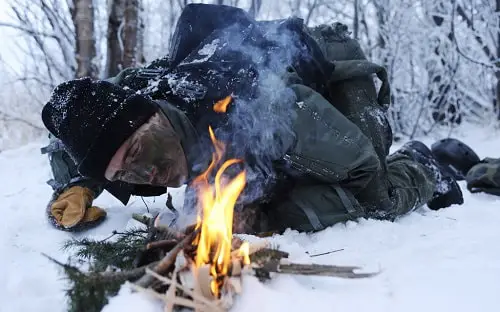
To make a fire burn quite a long time, please take a glance on my article regarding how to make a campfire burn all night. You could also learn how to light up wet firewood in a different article I’ve written – if you are camping during winter times, damp environment is inevitable.
Air Pollutants
In opposed to raindrops, when snow falls of the sky, it does it in a slower pace and therefore prone to catch air pollutants.
You wouldn’t be able to see it with your eyes – the snow would seem white and frankly quite clean. Still, if you are camping in areas with air pollution (most commonly next to coal-fired plants or urban areas) – it is very likely the ice would contain black carbon in it.
Also, the air above metropolitan cities is reached with soot which might come from either power factories or wood-burning stoves. Of course, these particles usually do more harm when inhaled, although they aren’t innocent when digested either.
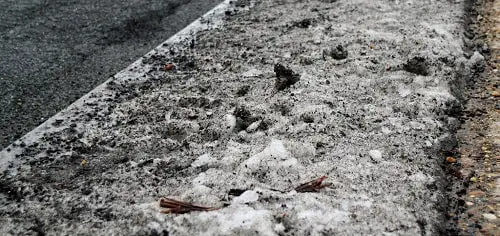
Pesticide
If you are camping next to farms or previously growing soils – it is very likely to contain different kinds of pesticides. That could even be the case when you have snow in your backyard, and your kids happened to put some snow in their mouth.
Also, snow doesn’t get soaked by the ground as quickly as liquid water – it first has to melt. Hence, it spends more time on the ground and has a more significant opportunity to absorb pesticides.
How to Melt Snow For Drinking Water
So eating snow might help you hydrate if you are camping and have a limited amount of water – that’s what I’ve shown thus far. The question now is how to melt it appropriately so it would be safe to drink and be at the right temperature.
Gathering The Snow
First, when you approach the snow pile – make sure that you pick the pieces at the top and not those at the bottom. The reason for this is quite apparent – snowflakes at the top are fresher and most probably even cleaner.
If it doesn’t snow at the moment – I suggest that you wait a while until it is and gather the flakes which have just dropped on the ground.
Melting Tricks
There are many ways you can heat the snow to turn it into fresh drinking water.
- First, you can use your body warmth – gather the snow into a bottle and place it inside your jacket. When you do it, make sure that you cover the container with towels or napkins, so it doesn’t wet the inner part of your clothing.
- If you wish to maintain your body warm you could also use fire to melt the snow. Gather the snowflakes into a pot and merely place it over the flame for a while. If you have a lid – use it, this way water wouldn’t evaporate much, and you could enjoy a higher amount of liquid.
- For last, if the clouds do not block sunlight, you can use solar radiation to heat your pile. Gather the snow into a plastic bag (preferred a black one), and place it in an exposed area for a while. If the bag features dark colors, it will get warm more quickly, and your water would be ready in no time.
Does Eating Snow Cause Hypothermia?
We all know that eating cold stuff decrease our body temperature, although can it be that severe that it would end up with hypothermia?
Well, my common sense gave me the feeling it could; however, I wasn’t 100% sure about that. Therefore, I went searching for reliable sources and came up with Dr. Mercola Website.
According to him, one of the dangers with eating snow is indeed hypothermia which might lead to heart failure (which is the leading cause of death on that matter).
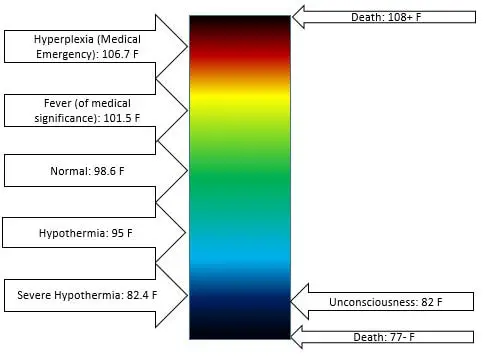
In a case you wish to eat some snow to hydrate, I suggest that you equip yourself with some adequate clothing, so you lose heat as less as possible.
Also, don’t exaggerate it by eating non-stop – give your body a break once in a while so it could regain its warmth and doesn’t drop temperatures at once.
What Are The Signs of Hypothermia?
Hypothermia is an emergency and could happen when you eat snow – for that, and it is essential to know what are its signs and red flags. As a reliable source, I relied on the Mayo Clinic website.
According to it, among the symptoms associated with hypothermia are shivering, slurred speech, shallow breathing, weak pulse, clumsiness, drowsiness, confusion, loss of consciousness and cold skin.
When that happens to someone near you – the first thing you have to do is calling 911 for assistance. If you plan on camping in areas with no cellular reception, I suggest that you get yourself a rescue transducer for emergencies like this.
After you called for help, put the person in a closed shelter so that winds and rain do not escalate things and drop the temperatures even more.
Also, it is essential to cover the injured with blankets and clothing. If it doesn’t rain and you have a fire going – place your friend next to it and provide him with some cover from above.
Conclusions
It’s hard to tell exactly how much water are invested in the snow heating process which happens when we put it into our system.
Still, when thinking about it from a logical angle – energy is spent primarily on digestion and temperature elevation. The amount of calories consumed in the digestion section is precisely the same as when we drink water since the snow reaches the intestine in a liquid form.
Therefore, the only difference between eating ice and drinking water is the energy spent on heating back our body temperature, and I’ve already shown how low that number is (160 calories per a liter of ice which are 0.16 kcal – a dietary calorie is actually a kilocalorie).
Hence, the conclusion is that eating snow doesn’t help dehydration – it merely drops our body temperatures down and might lead to other risks such as hypothermia, pollutants exposure, and waterborne diseases.
When you decide to eat snow – you can melt it by using your own body temperature, although I believe taking advantage of your campfire would be more beneficial.
If you suspect hypothermia, it is essential that you call for help immediately and do anything you can to maintain the body warm (blankets, jackets, coats, etc.)
I hope my article has answered your question and made it clear why eating snow doesn’t dehydrate you. If you have your own insights about that topic, let me know all about them by leaving a comment below!
